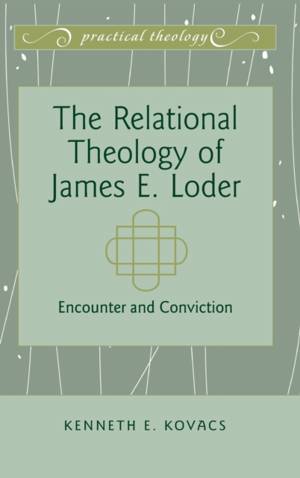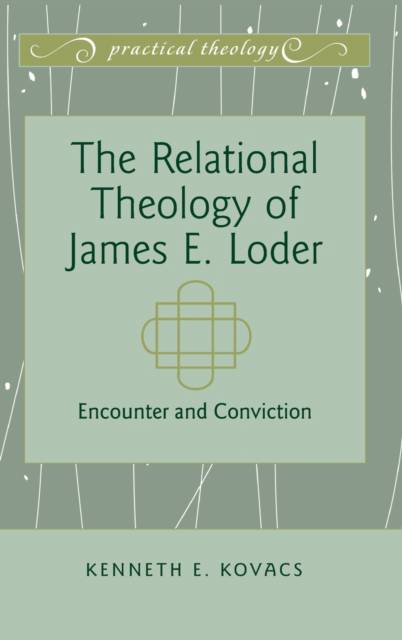
- Retrait gratuit dans votre magasin Club
- 7.000.000 titres dans notre catalogue
- Payer en toute sécurité
- Toujours un magasin près de chez vous
- Retrait gratuit dans votre magasin Club
- 7.000.0000 titres dans notre catalogue
- Payer en toute sécurité
- Toujours un magasin près de chez vous
181,45 €
+ 362 points
Description
The work of practical theologian James E. Loder, Jr. (1931-2001) deserves a wider audience. For more than forty years, he developed and exercised an interdisciplinary methodology that identified patterns of correlation in the fields of psychology, educational theory, phenomenology, epistemology, and physics, producing a compelling theological vision that centers on the person and work of the Holy Spirit engaging and transforming human life. At his untimely death in November 2001, Loder was the Mary D. Synnott Professor of Philosophy of Christian Education at Princeton Theological Seminary, where he lectured primarily in the areas of human development and the philosophy of education.
This book introduces and examines, explores and untangles the complexity of Loder's thought in order to make it more accessible to a broader audience. At the core of Loder's work is a relational phenomenological pneumatology of inestimable value to the theologian engaged in the ongoing renewal of the church. The Christian life is preeminently relational, distinguished by a relationship with God constituted by Jesus Christ, and sustained by the Holy Spirit. Relationality, Loder claims, takes place in and through the life of the Holy Spirit who operates within a complementary relationship with the human spirit, through an analogia spiritus: a profound, transformational interrelation of the Holy Spirit and the human spirit. The Holy Spirit, intimately connected to the person and work of Christ, takes up and extends the work begun in the incarnation by enfleshing the presence of Christ, thus transforming human life. Loder is distinctive for articulating a pneumatology that incorporates 'how' the self participates in the relationship and the way the self, through the relationship, comes to have a full knowledge of itself, the world, and God. It is precisely the logic of this Christomorphic dynamic that has extraordinary implications for the way we attempt to fathom the depths and convey the meaning of Christian experience. Loder's relational phenomenological pneumatology contains rich and principally unrecognized resources for providing new frameworks for the Christian life.
This book introduces and examines, explores and untangles the complexity of Loder's thought in order to make it more accessible to a broader audience. At the core of Loder's work is a relational phenomenological pneumatology of inestimable value to the theologian engaged in the ongoing renewal of the church. The Christian life is preeminently relational, distinguished by a relationship with God constituted by Jesus Christ, and sustained by the Holy Spirit. Relationality, Loder claims, takes place in and through the life of the Holy Spirit who operates within a complementary relationship with the human spirit, through an analogia spiritus: a profound, transformational interrelation of the Holy Spirit and the human spirit. The Holy Spirit, intimately connected to the person and work of Christ, takes up and extends the work begun in the incarnation by enfleshing the presence of Christ, thus transforming human life. Loder is distinctive for articulating a pneumatology that incorporates 'how' the self participates in the relationship and the way the self, through the relationship, comes to have a full knowledge of itself, the world, and God. It is precisely the logic of this Christomorphic dynamic that has extraordinary implications for the way we attempt to fathom the depths and convey the meaning of Christian experience. Loder's relational phenomenological pneumatology contains rich and principally unrecognized resources for providing new frameworks for the Christian life.
Spécifications
Parties prenantes
- Auteur(s) :
- Editeur:
Contenu
- Nombre de pages :
- 300
- Langue:
- Anglais
- Collection :
- Tome:
- n° 2
Caractéristiques
- EAN:
- 9781433113369
- Date de parution :
- 23-06-11
- Format:
- Livre relié
- Format numérique:
- Genaaid
- Dimensions :
- 156 mm x 234 mm
- Poids :
- 616 g

Les avis
Nous publions uniquement les avis qui respectent les conditions requises. Consultez nos conditions pour les avis.






